This week, I’m dropping a little beard butter into the production skillet, and cooking up some Q&A with one of the top demo producers out there right now (oh, and he’s an overall good dude)…Eric Romanowski! Voiceover demos are the essential calling card of any serious professional VO talent. Whether you’re a working talent with good demos on deck, or you’re jumping into the VO pool and in need of that first demo, we’re going to do a deep dive into some essential demo wisdom. Demos are an important investment. As with coaching and representation, partnering with the right producer is essential to your branding and success. So, let’s get into it with the man, the beard…the Eric.
- MP: Thanks for stopping by and sharing some of the wisdom of the beard! Let’s go full “origin story”. What were you doing right before you dove into the deep end of the creative entrepreneurial pool? Did you see this as a career trajectory? And…did you have that beard in high school?
ER: Thanks for stopping by? You showed up at my house. This is awkward. But whatever let’s do this, I guess.
Before I jumped into the creative entrepreneurial pool, I was working in Rochester, NY at what was then Clear Channel. I had the least glamorous job possible (board operator and overnights), but I’m forever grateful, because that’s where I fell in love with production, and more specifically Radio Imaging. As glamorous as that job sounds, in ’05, I landed my first full time radio gig in Richmond, VA to run a morning show/produce Imaging. This is when I launched Ear Blowing Audio Productions and started producing demos on a freelance basis. At this time, I had no intention of doing it as a full time career. As I continued on my radio journey (next stop, Entercom Norfolk) I continued producing demos, every year gaining more and more traction. Becoming a demo producer just kind of happened, and I’m glad it did. In 2017, I left radio (on my own terms) to pursue Ear Blowing Audio Productions full time.
Beard in high school? Ha! I struggled to even grow a goatee in college. I’m making up for lost time now. - MP: In your mind, what is the essential function of a demo?
ER: To land more work – whether it be through picking up your first agent(s)/ gaining more representation, or using it as a great marketing tool to pick up work directly with potential clients. There’s nothing more rewarding than a demo client telling me they booked something directly off a demo. It’s an indescribable feeling, but that’s ROI right there. - MP: Which genre of VO demo do you find yourself producing most often? Is that by design? Is there any particular demo that everyone should have handy, regardless of which genre is their bread and butter gig…and why?
ER: At first it was Radio Imaging, mainly because that’s what I came from and not as many demo producers do it (and do it at a high level). Now, I’m producing a lot of commercial demos, on top of Imaging, Promo, Narration, and Affiliate. I enjoy the change of pace and keeping things fresh by dabbling in those five areas.
I don’t think there’s a one size fits all in VO, but if I were to generalize, I’d say Commercial is most important. Most agents want to hear a solid commercial demo because that’s where a lot of the work is coming from. Again, generalizing here. I actually know some people who don’t really book ANY commercial work. - MP: Do you ever receive guidance from an agent or manager prior to producing one of their talent’s demos? Do you think that talent should discuss the demo with their agent before going into production? If so, what things should they chat with their agent about before sitting down for a little “Eric” time?
ER: Yes. In fact, I’m open to any valuable input, as long as the end product turns out spectacular. If your agent/manager is going to be one of the people selling you, why not reach out to them to at least get their thoughts? They might suggest something you didn’t even think of or have some pointers on what to cover (or avoid) on the demo. Doesn’t mean you HAVE to do it, but you’re at least keeping them in the loop.
It’s ultimately the talent’s career so I believe they should make the final decision, but getting guidance from managers/agents (as well as a very honest demo producer) is a smart approach. - MP: When is someone really ready to knock out their first demo? Do you have any criteria you use as to how you agree to work with someone? How do you feel coaching figures into this process?
ER: The million dollar question. I think the answer is when the talent is polished enough they can compete and land gigs. After (most) talent have been coached extensively, and they feel comfortable (along with their coach) in proceeding to the next step – then it’s time to talk demo. Does that mean they’re landing huge national campaigns? Probably not – but they need to at least be competitive and getting some sort of ROI. Don’t rush the process. Rome wasn’t built in….well, you get the idea.
I have certain criteria I ask when someone approaches me about demos. Won’t get into specifics, but by those responses, it gives me a good idea of where they’re at in their career. That, and of course listening to their current demos. If I think another demo needs updating or don’t think they can be competitive and get an ROI on a certain demo, I will steer them in another direction or pass on the project. I’m certainly not the end all be all, but it is my brand and business I’m protecting (as well as theirs) so if I pass on a client, it’s because I don’t think they’re ready or that we’re a good fit. I’m very fortunate to be in a position where I can be more selective on who I work with. - MP: As a coach, and having kept a close eye on The VoiceOver Community (shout out to my tribe!), I have seen and heard a consistent amount of misunderstanding regarding demos. Cost is one thing that gives some a bit of “sticker shock”. Help some of these talent understand the value of a demo…and why a good demo isn’t just a few bucks. I mean, why can’t someone “just have my buddy at the radio station do it”. Or, if they are proficient with audio editing, then why can’t they just do it themselves? (I can hear you sighing right now!) 😉
ER: The value of a good demo is just that, valuable, but the value of a GREAT demo, is priceless. Demos can lead to agency/manager signings, which can lead to more work. In addition, a great demo can land direct bookings. With one solid paying gig, the demo can pay for itself. Furthermore, the amount of time that is put into a demo by top demo producers is substantial, so you’re paying for their time and expertise. For me personally, there’s added value in not just what I offer during the demo process, but everything post-demo too.
One thing to keep in mind is just because someone can produce, doesn’t make them a demo producer. I’ve had to fix many demos in my day and a lot of them are done by people who can produce, but don’t necessarily produce demos and understand all the nuances. There’s a method behind the madness.
I don’t think anyone should produce their own demo, especially if they can afford not to. I get it, demos aren’t cheap – you have to fake it until you make it, but a bad demo can do more harm than good. Investing in 3 cheap demos that don’t get you any return, will end up costing you more when you having to splurge for the more expensive demo on top of the 3 cheap ones. - MP: What is a typical day with the beard…err…Eric? In other words…what is the method to your madness? Is there a pretty standard way you orchestrate the prep and recording session portions of the process?
ER: If I divulge too much here, I’ll give away the madness to my madness, but yes, there is a method. First I wake up with massive bed-beard. Then I massage beard butter into my beard. Yes, it’s a real thing. Google it.
No, in all honesty, prepping for a demo is the foundation of a great demo. I have a system in place that allows me to get the most out of talent and to make sure it’s a true representation of them. That way they’re proud of it and excited to market it. Have I skirted the question enough by giving a vague response? A real lady doesn’t kiss and tell. Wait a minute… - MP: I don’t want you to name names, but I’m sure you’ve heard your fair share of “OMG…wha…really?!?!?” demos. I’m also sure you’ve heard some demos that have inspired you to raise your game and become an even more proficient master. If you would be so kind, please share the wisdom you have culled…and toss in some golden “do’s and don’ts” of a proper demo.
ER: I’ve heard my share of mind blowing demos….both good and bad. Never stop learning:
Do’s –
– ….coach before a demo. You’re going to invest thousands in new demos – be as prepared as possible!
– …..make fewer, greater demos. 3 GREAT demos will get you much further than 8 mediocre ones.
-….. Extensive. Research. Reputable coaches/producers have a long list of clients who will jump at the opportunity to sing their praises.
Don’t –
-…try to be everything to everyone. Your producer/coaches/agents can offer advice and guidance on where you can make the biggest impact. Very few talent can do it all.
-….produce your own demos. This is a general statement. Yes, there are some voice people who can pull it off, but for most, getting an outside critical/objective ear is invaluable.
-…let your demos become dated and stale. Your demos are a representation of YOU. So if you’re not dated and stale, your demos shouldn’t be either. ☺ - MP: How often do you feel that someone should freshen up their demos? Is there an indicator or creative inventory a talent should take to determine if “it’s time”?
ER: For me personally, there’s a lot that plays into this answer, but generally every 3-4 years will more than suffice in my mind. That’s under the assumption that you’re working regularly, investing in coaching year round, and improving on a daily basis.
I do think it depends on the situation too though. For instance, a radio imaging demo that highlights an artist that isn’t relevant anymore or a promo demo featuring a few cancelled shows, can make a talent look out of touch and not quite buttoned up. Keep your demos current and relevant.
I always tell talent who are unsure whether they need an update or not, to listen to their current demos. Does it reflect their current ability? Have they improved enough to invest the money in new ones? Are they happy with their performance AND the production? Are they working for them and landing representation/jobs? If so, could they perhaps take the demo up another level by working with a more advanced coach and/or producer? These are just a few of the things to think about before taking the plunge. - MP: You’re a solid member of the daddy club. I remember having small children bouncing around whilst crankin’ away on my VO dreams down the hall in my studio. I mean, we are members of a club that willfully isolates ourselves in a room, for hours on end and with no human interaction. So, I feel there’s great value for family folk…heck…anyone in our biz to develop a healthy life/work balance. How do you strike that balance and still stay productive?
ER: It’s something I still struggle with every day. Been the hardest adjustment for me. Work hard to make more money so my kids can have/do more…or work less/make less, so my kids can have more of me. I think we know the answer. I try to be more productive when they’re not here, and during the days/weekends they’re home, try to be more present. I’ll work nights a lot of the time too so that I can hang out with the family on weekends. I still haven’t perfected the balance, but feel like I’m improving. Need to do a better job of “me” time too, but we’ll get there. It’s hard to turn it off when you love what you do.
Bonus Lightning Round!
- Sports fan? Who are you rooting for? I’ll watch most sports, but only invest energy into my Buffalo Bills. And yes, it requires a lot of painstaking energy.
- The most epic awesome concert you ever attended? Tom Petty.
- When your wife rolls her eyes at you, what are you typically doing? Breathing
- If you weren’t a rockstar demo producer, what would be your gig? Just a rockstar. Be on the lookout for my daughter’s band, Marley and The Romos – coming to a stage near you in 2031!
- What song, movie or performance inspires you and gives you “the feels”? Anything involving Denzel Washington. #ManCrush
- What is your definition of a “perfect” Saturday afternoon? Hanging with the fam.
- Your culinary guilty pleasure? Anything dessert related.
- One talent you would give anything to have? How about a super power, like see into the future?
- Let’s hop in your DeLorean and go back to when you were sixteen years old. What is the one golden piece of wisdom that you want to share with young Eric? CONFIDENCE is KEY – You HAVE to believe in yourself.
- You’re at your favorite restaurant, and you’re sitting at a table with four chairs. Living or not, who would be your top three dream dinner companions? Wow. Tom Petty, (football legend) Barry Sanders, Denzel, and my Nana. I’ll stand.
- Besides being a talented “demo dude”, what else brings you joy? The 3 amigos (kids) – Marley, Harper & Quinn.
Check out Eric’s work at www.earblowingaudio.com
Join one of the largest and most active voiceover communities on Facebook at www.thevoiceovercommunity.com


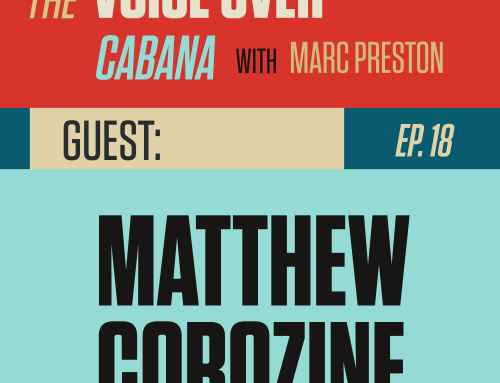
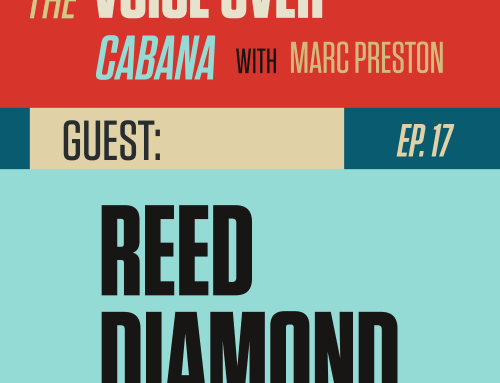
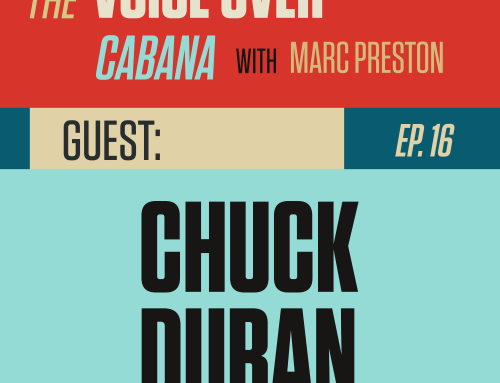

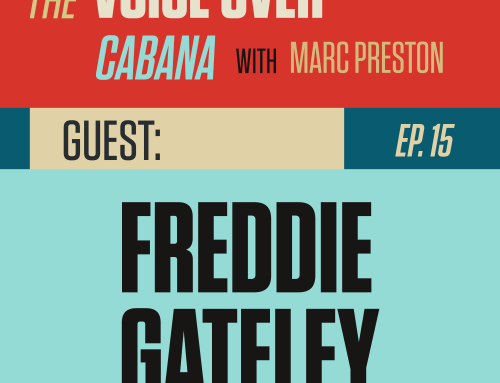
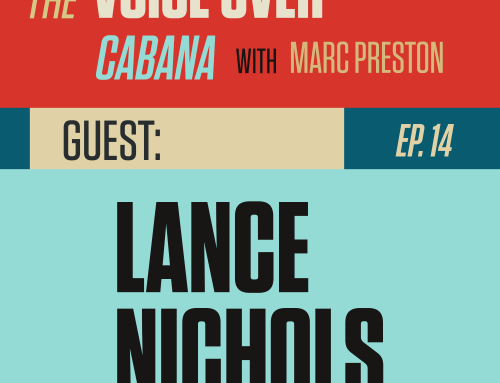
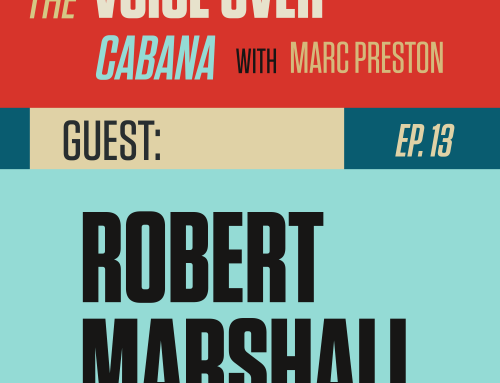
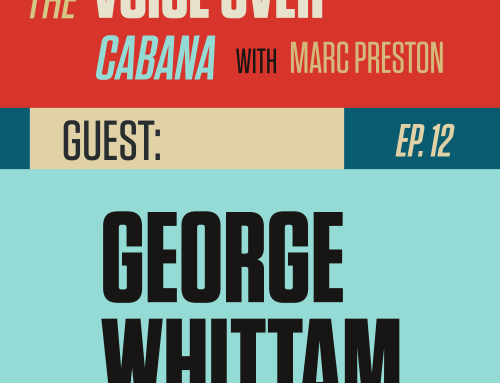
Leave A Comment